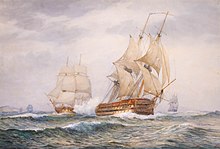
Back Batalla del Convoy de Malta Spanish Bataille du convoi de Malte French マルタ護送船団の海戦 Japanese Bitwa konwoju maltańskiego (1800) Polish Batalha do Comboio de Malta Portuguese
| Battle of the Malta convoy | |||||
|---|---|---|---|---|---|
| Part of the Mediterranean campaign and the Siege of Malta during the War of the Second Coalition | |||||
 Battle of the Malta Convoy, HMS Success attacks Généreux on 18 February 1800 by E. H. Dyason | |||||
| |||||
| Belligerents | |||||
|
|
| ||||
| Commanders and leaders | |||||
|
|
| ||||
| Strength | |||||
|
3 ships of the line 1 frigate |
1 ship of the line 3 corvettes 3 transport ships | ||||
| Casualties and losses | |||||
| 10 killed and wounded |
1 killed 1 ship of the line captured 1 transport ship captured | ||||
The Battle of the Malta Convoy was a naval engagement of the French Revolutionary Wars fought on 18 February 1800 during the Siege of Malta. The French garrison at the city of Valletta in Malta had been under siege for eighteen months, blockaded on the landward side by a combined force of British, Portuguese. and irregular Maltese forces and from the sea by a Royal Navy squadron under the overall command of Lord Nelson from his base at Palermo on Sicily. In February 1800, the Neapolitan government replaced the Portuguese troops with their own forces and the soldiers were convoyed to Malta by Nelson and Lord Keith, arriving on 17 February. The French garrison was by early 1800 suffering from severe food shortages, and in a desperate effort to retain the garrison's effectiveness a convoy was arranged at Toulon, carrying food, armaments and reinforcements for Valletta under Contre-amiral Jean-Baptiste Perrée. On 17 February, the French convoy approached Malta from the southeast, hoping to pass along the shoreline and evade the British blockade squadron.
On 18 February 1800 lookouts on the British ship HMS Alexander sighted the French and gave chase, followed by the rest of Nelson's squadron while Keith remained off Valletta. Although most of the French ships outdistanced the British pursuit, one transport was overhauled and forced to surrender, while Perrée's flagship Généreux was intercepted by the much smaller frigate HMS Success. In the opening exchange of fire, Success was badly damaged but Perrée was mortally wounded. The delay caused by the engagement allowed the main body of the British squadron to catch up the French ship and, badly outnumbered, Généreux surrendered. Perrée died shortly after being wounded, and none of the supplies reached Malta, which held out for another seven months against increasing odds before surrendering on 4 September 1800.
© MMXXIII Rich X Search. We shall prevail. All rights reserved. Rich X Search